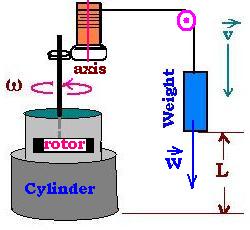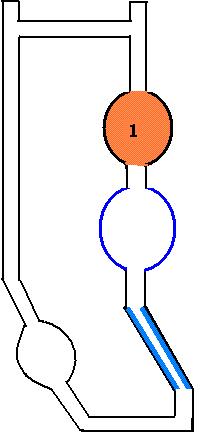Contents
© The scientific sentence. 2010
|
Thomas-Stormer viscometer
1. Dynamic viscosity: Thomas-Stormer viscometer:
The viscosity is the fluid resistance to shear or flow

The Tomas Stormer apparatus mesures a dynamic viscosity of a liquid as oil.
The shear stress on the surface of the rotor is proportional to:
- The viscosity μ of the liquid, and
- The rotation speed of the rotor.
Hence:
σ = k μ ω
If S is the wetted surface area of the rotor, and F is the tangential force on the
edge of the rotor, we can write:
F = σ S
The related torque is τ = F x rrotor
rrotor is the radius of rotor.
We neglect frictions in the system to write that the power exerted on the rotor is
equal to the power supplied by the weight W in order to move this weight
of a distance L = v x t.
We have:
L = 2 x π x raxis
Then
v = L/t = 2 x π x raxis x naxis/t (1)
naxis is the number of rotations made by the axis.
Since the power of the falling weight and the power dissipated over the
rotor by viscous steress are equal, we can write:
Powerfluide = Powerweight; that is:
τ ω = W x v
W is the weight of the falling body.
In other hand: ω = 2π x rrotor x nrotor/t (2)
The relationships (1) et (2) give:
2 x π x raxis x naxis/v = 2π x rrotor x nrotor/ω
Or:
rrotor x nrotor/ω = raxis x naxis/v
Then:
μ k = σ/ω = F/S/ω = τ / rrotor/S/ω =
W x v/ω /S/ raxis x naxis/v/ =
W /ω /S/ raxis x naxis /nrotor/rrotor
We define the constant K of the viscometer as:
C = (W x raxis x naxis)/(rrotor naxis x S x k)
Forethermore:
μ = C x W / ω
In the SI system the dynamic viscosity unit is N.s/m2 = Pa.s = kg/m.s where
In the metric CGS system, the unit is g/cm.s = dyne.s/cm2 = poise (p) = 1/10 Pa.s = 100 cP
Pa is the Pascal and cP is the centiPoise.
Water at 20 oC has a dynamic viscosity of one (1) centiPoise.
2. Kinematic viscosity:
Kinematic viscosity is, by definition, the ratio of absolute or dynamic viscosity
to density:
ν = μ /ρ
where ν = kinematic viscosity, μ = absolute or dynamic viscosity, and ρ = density
In the SI system, the unit is m2/s
In the CGS system, the unit is the Stoke (St) where 1 St = 10-4 m2/s
We use also the Centistoke (cSt) = 1/100 St where
The kinematic viscosity of water at 20 oC is 1.0 cSt.
3. Measurement:
 For a fluid liquid, we use communly the Oswald apparatus tp mesure the viscosity.
We set the following relationship:
For a fluid liquid, we use communly the Oswald apparatus tp mesure the viscosity.
We set the following relationship:
μ = k ρ t
where k is a constant callibration of the apparatus, &pho; density and t the time spent by the fluid
to live a part "1" of the cappilary viscometer.
According to a known value of the kinematic viscosity of a certain fluid, we just make the
ratio μ /μknown= k &pho; t1 / k &pho;known t2; and measuring the times
t1 and t2 to have the value of μ
μ = μknown ρ t1 / ρknown t2
We have also for the kinematic viscosity:
ν = νknown t1 / t2
We use also Saybolt, Engler, or Brookfield viscosimeters depending on circumstances.
|
|